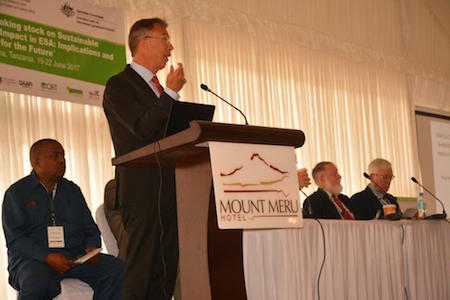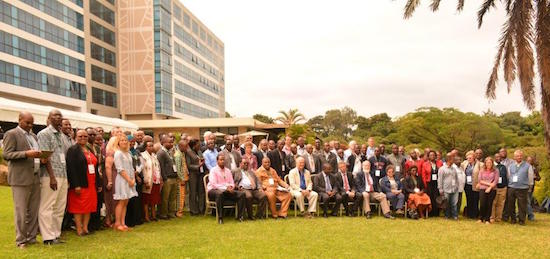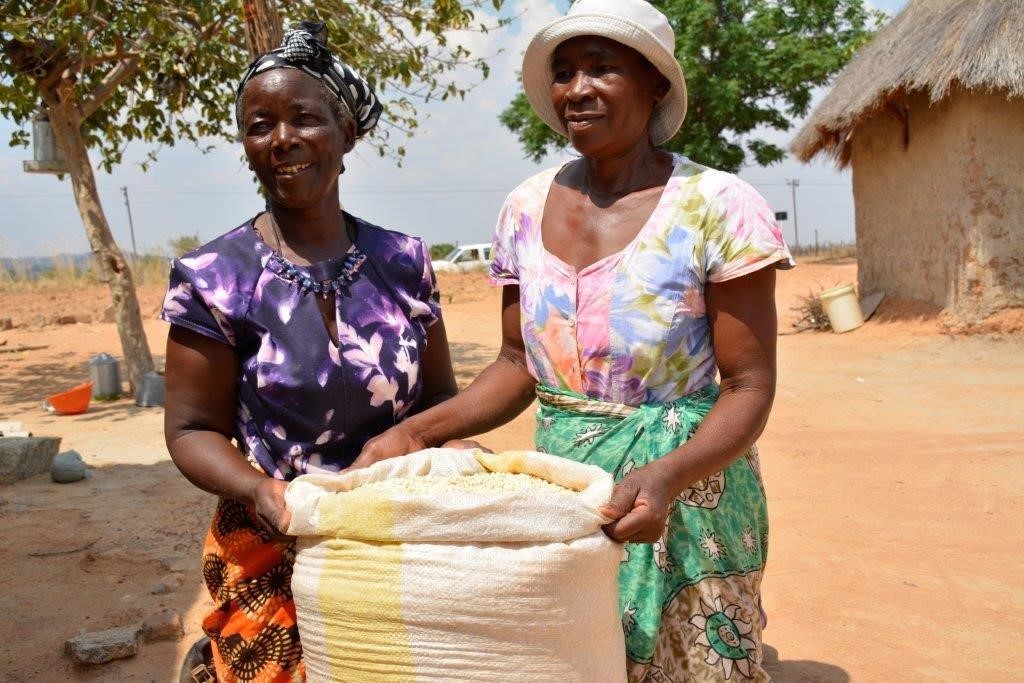
HARARE, Zimbabwe (CIMMYT) – Delegates at a conference in June called for a new focus and increase in investment to ensure eastern and southern Africa’s farming systems can withstand the impacts of climate change.
Africa is likely to be the continent most vulnerable to climate change, according to the UN Framework Convention on Climate Change. Smallholders produce around 80 percent of all food in sub-Saharan Africa, and rely primarily on rainfall for irrigation – a source that is becoming scarcer and unpredictable under climate change. Farming is also often practiced in marginal areas like flood plains or hillsides, where increasing and more intense weather shocks cause severe damage to soil and crops.
Tanzania’s Minister for Agriculture, Food Security and Cooperatives Charles Tizeba said during a conference on the future of the Sustainable Intensification of Maize-Legume Based Cropping Systems for Food Security in Eastern and Southern Africa (SIMLESA) project, an initiative led by the International Maize and Wheat Improvement Center (CIMMYT) and funded by the Australian Centre for International Agricultural Research (ACIAR), that a paradigm shift in agricultural development is needed to enable smallholder farmers, especially those in rural areas, to produce enough to feed themselves and to sell.
Sustainable agricultural practices, improved seed varieties, use of fertilizers and better infrastructure are all technologies and practices that have been successfully tested by SIMLESA and have the potential to be expanded across the region, said Tizeba. He also called on governments in eastern and southern Africa to develop agricultural agendas based on farmer needs and opportunities SIMLESA identified through the project’s research efforts.
Over 100 people representing different governments, research institutions, development agencies and the private sector gathered in Tanzania to participate in the taking stock on sustainable intensification research for impact in eastern and southern Africa conference. Since 2010, SIMLESA has successfully tested locally-adapted sustainable farming systems throughout eastern and southern Africa. The project began its second phase in July 2014 and will focus on expanding climate-resilient technologies and practices throughout the region.

To date, a total of 268 and 378 maize and legume on-farm participatory variety selections were conducted by SIMLESA, where best performing maize and legume varieties that met farmer preferences were selected and scaled up by partner seed companies. The project has influenced over 235,000 farmers who adopted at least one sustainable intensification technology or practice.
CIMMYT Director General Martin Kropff called for the adoption of “climate-smart agriculture” that will make crops more resilient to continuing extreme weather events.
“For our farmers to be productive and ensure food security, we need to build resilience to climate change…we need to invest in new agricultural innovation now,” said Kropff.
Andrew Campbell, ACIAR chief executive officer, said climate change has already had a powerful negative effect on agriculture and food security for the world’s most vulnerable, and that these effects will become even worse in the future.
“It’s critical to integrate research into development initiatives,” said Campbell. “In this regard, SIMLESA’s work, in partnership with national agricultural research systems, becomes even more critical.”
At the project level, SIMLESA will aim to scale its sustainable intensification technologies to 650,000 farm households by 2023 in eight target countries through different partnership arrangements.
Many of the speakers at last week’s event said smallholder farmers must be part of discussions on climate change and food security as they are often among those most touched by the impacts of climate change, and they play an integral role in global agriculture systems.
To achieve the best results, SIMLESA will channel its experiences and lessons learned since its inception in 2010 and scale out its work through shared analysis, common research questions and learning through the monitoring, evaluation and learning portfolio, communications and knowledge sharing and a lean project management structure.
SIMLESA’s positive assessment of conservation agriculture-based sustainable intensification in the region suggests that policies that strengthen national and local institutions, build infrastructure for sustainable farming, improve financial investment in agriculture and increase access for innovative private investors, play a key role in alleviating poverty and food insecurity in the region.
The Sustainable Intensification of Maize-Legume Based Cropping Systems for Food Security in Eastern and Southern Africa (SIMLESA) project was launched in 2010. Funded by the Australian Centre for International Agricultural Research (ACIAR), SIMLESA aims to improve the livelihoods of smallholder farming communities in Africa through productive and sustainable maize–legume systems and risk management strategies that conserve natural resources. It is managed by CIMMYT and implemented by partners in Ethiopia, Kenya, Malawi, Mozambique and Tanzania.
 Capacity development
Capacity development 

